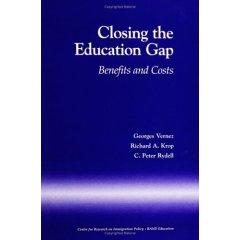| 2020ok Directory of FREE Online Books and FREE eBooks |
Free eBooks > Nonfiction > Education > Education Theory > Contemporary Methods > Multicultural > Closing The Education Gap: Benefits And Costs
Closing The Education Gap: Benefits And Costsby Georges Vernez  Download Book (Respecting the intellectual property of others is utmost important to us, we make every effort to make sure we only link to legitimate sites, such as those sites owned by authors and publishers. If you have any questions about these links, please contact us.) link 1 About Book F. Galloway, CHOICE Magazine, March 2001 Powerful and insightful....a must-read for educational policymakers and researchers. Highly recommended for general readers, upper-division undergraduates, graduate students, and faculty. Book Description How much would it cost and what would the benefits be if blacks and Hispanics graduated from high school, went to college, and graduated from college at the same rate as non-Hispanic whites? The answer to this important question for the future of the nation is explored in this report. The costs of education would be high, increasing by about 20 percent in California and 10 percent in the rest of the nation. But the benefits, in the form of savings in public health and welfare expenditures and increased tax revenues from higher incomes, would be even higher. Indeed, the added costs of providing more education to minorities would be recouped well within the lifetime of taxpayers called upon to make the additional investments. The nation is experiencing a rapid immigration driven increase in the share of Hispanics in the school age population. From the Publisher Education, more than ever, is key to a person's lifetime economicprospects as well as to making the most of one's talent and interestsin a world that is rapidly changing both economically and politically.Indeed, as the economic returns to a postsecondary education haveincreased, those associated with the lack of such an education havediminished, contributing to an increase in economic disparities notonly in American society, but throughout the world. At the sametime, changes in technology and the growing availability of informationare placing a premium on people's ability to process informationin making everyday work and life decisions. Those who developa mastery of the new information media and can apply them ineveryday decisions will have an advantage over those who do not.Finally, the relationships between nations and, within nations, betweengovernments and civil society are also growing more complex,and perhaps more democratic. Again, those who gain an understandingof these changing relationships and of the opportunitiesthey offer will have an advantage over those who do not.Equality of opportunity in education for all ethnic groups in theUnited States is a goal that remains to be met. Over the years, littleprogress has been made in closing the gap in college-going and collegecompletion between blacks and Hispanics, on the one hand,and non-Hispanic whites and Asians, on the other. Rapid changes inthe ethnic composition of the nation's population should make narrowingthis gap ever more pressing. As a result of growing immigrationsince the mid-1960s, the fastest growing segment of the U.S.population is Hispanic, a group that, compared to others, is currentlyexperiencing a significant lag in educational attainment. By year2015, a majority of those entering the labor force for the first time areexpected to be Hispanics (48 percent) and blacks (18 percent). Inhigh immigration states such as California, these minority groupswill constitute an even larger share of new entrants into the laborforce.We undertook this study to (1) promote a better understanding ofwhat these changes in the population's ethnic composition mean forthe nation's education of the labor force and for educational institutionsand (2) explore the benefits and the costs associated withclosing the gap in educational attainment, fully or partially, betweenethnic groups. The costs of closing the gap would seemingly be high,but the public and societal benefits of doing so would be even higher.This study is the first to estimate the implications for postsecondaryeducational institutions of closing the educational attainment gap. Asignificant by-product of this study is the simulation model that wasdeveloped, which states across the nation can use to assess the implications of closing the education gap for their educational institutionsand for public spending on social and health programs.This project was sponsored primarily by The Andrew W. MellonFoundation. It also received support from The William and FloraHewlett Foundation. The research was carried out in RAND Education'sCenter for Research on Immigration Policy. The results shouldbe of interest to federal and state policymakers, education leaders,administrators of primary to graduate schools, and all those with aninterest in furthering the goal of equal educational opportunity forall. About the Author GEORGES VERNEZ (Ph.D., Urban and Regional Development, University ofCalifornia, Berkeley) is a Senior Social Scientist and Director, Center for Research onImmigration Policy, at RAND. Richard Krop (The George Washington University M.A. International Affairs) is a RAND Graduate School Budget Analyst. Peter Rydell (U. Pennsylvania PhD Regional Science) is a Senior Social Scientist at RAND whose research interests include Military Personnel, Criminal Justice, Civil Justice, Rent Control, Housing Policy, and Welfare Caseloads. Related Free eBooks
| Related Tags |












SEND A COMMENT
PLEASE READ: All comments must be approved before appearing in the thread; time and space constraints prevent all comments from appearing. We will only approve comments that are directly related to the article, use appropriate language and are not attacking the comments of others.